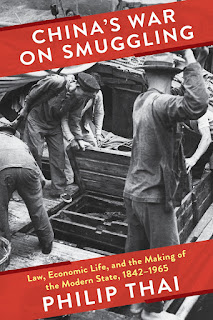I am truly grateful to Mitra for inviting me to serve as a guest blogger for October 2021. I have long been inspired by work in legal history and remain honored to have met so many scholars with such exciting research agendas. Like so many others around the world, I have spent the past year and a half focused on staying safe and tending to everyday life. Meanwhile, my own book, China’s War on Smuggling: Law, Economic Life, and the Making of the Modern State, 1842–1965, is scheduled to be released in paperback this coming December. My tenure as guest blogger thus offers the perfect opportunity for me to (re-)introduce my work and (re-)connect with the broader community. In this post I will briefly sketch my personal and intellectual journey into legal history, and in future posts I will elaborate on my own work and my thoughts on the state of Chinese legal history.
Let me begin at the beginning. How did I become a legal historian? Like the case of so many other scholars, my own research trajectory has been shaped by personal experiences and formal training. My personal journey into the field probably began even before I knew anything about legal history. As an immigrant to the United States, I was acutely aware at a young age of the power of seemingly abstract laws in governing ordinary life. Every time my parents filled out some paperwork or presented documents for official business, for instance, I was confronted with small reminders that I was somehow marked by a different legal status than those of my peers. My experience was by no means unique, of course, and my impression of law remained abstract for some time. Still, the long reach of the law was something I quickly appreciated at a very intimate—even visceral—level in my own life.
My intellectual journey into legal history, by contrast, undoubtedly began when I signed up to work with Chinese legal historian Matthew Sommer. His book, Sex, Law, Society in Late Imperial China, made a deep impression on me when I was deciding between working with different advisors and figuring out what kind of historian I wanted to be. Although our research concerns differed—he was focused more on questions of gender and sexuality, I more on questions of state and economy—we shared an interest in understanding state-society relations through the lens of law. His methodology I would eventually adopt as my own. Juxtaposing different kinds of materials and placing them in mutual conversation helped sharpen the contrast between, say, laws on the books and testimonies in the courtroom, or formal jurisprudence and popular conceptions of law. From Matt, I learned to capture different kinds of historical realities by understanding the internal logic of laws and legal systems while always seeking to uncover how such logic unfolded in everyday life.
In future blog posts, I will detail how all this experience informs my own work, especially China’s War on Smuggling. In retrospect, I can see why it was no coincidence that my book on the history of smuggling on the China coast paid as much attention to individual encounters with the state as it did to the promulgation of laws. I will also provide a brief overview of recent Chinese legal historiography as well as recommendations of Chinese legal history research, which I hope will be useful to non-specialist readers of this blog.
I look forward to some productive conversations!
—Philip Thai
E-mail |
p.thai@northeastern.edu
Twitter |
@philip_thai
